目录
一 用队列实现栈
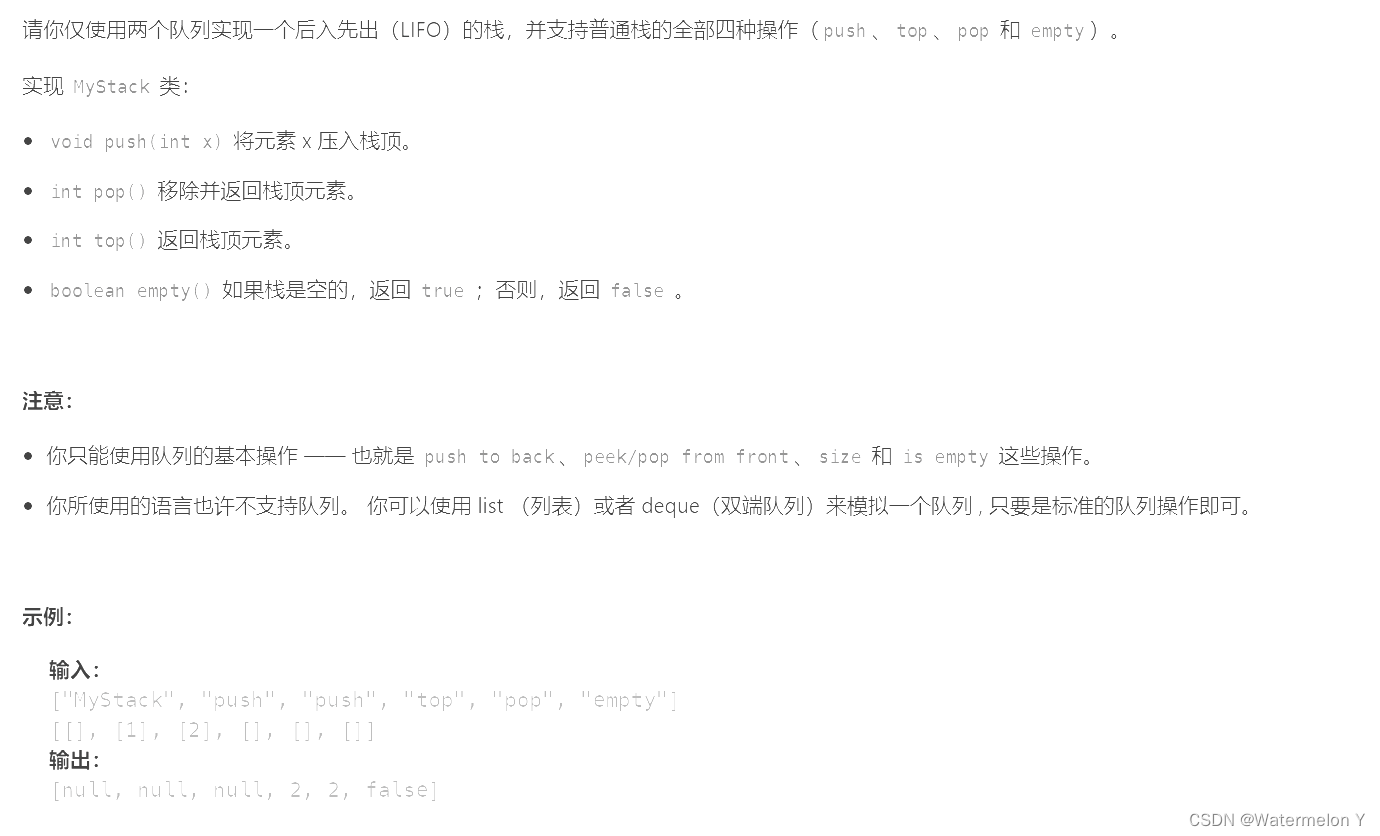
typedef int QDataType;
typedef struct QueueNode
{
struct QueueNode* next;
QDataType data;
}QNode;
typedef struct Queue
{
QNode* head;
QNode* tail;
int size;
}Que;
void QueueInit(Que* pq)
{
assert(pq);
pq->head = pq->tail = NULL;
pq->size = 0;
}
void QueueDestroy(Que* pq)
{
assert(pq);
QNode* cur = pq->head;
while (cur)
{
QNode* next = cur->next;
free(cur);
cur = next;
}
pq->head = pq->tail = NULL;
pq->size = 0;
}
void QueuePush(Que* pq, QDataType x)
{
assert(pq);
QNode* newnode = (QNode*)malloc(sizeof(QNode));
if (newnode == NULL)
{
perror("malloc fail");
exit(-1);
}
newnode->data = x;
newnode->next = NULL;
if (pq->tail == NULL)
{
pq->head = pq->tail = newnode;
}
else
{
pq->tail->next = newnode;
pq->tail = newnode;
}
pq->size++;
}
bool QueueEmpty(Que* pq)
{
assert(pq);
return pq->head == NULL;
}
void QueuePop(Que* pq)
{
assert(pq);
assert(!QueueEmpty(pq));
if (pq->head->next == NULL)
{
free(pq->head);
pq->head = pq->tail = NULL;
}
else
{
QNode* next = pq->head->next;
free(pq->head);
pq->head = next;
}
pq->size--;
}
QDataType QueueFront(Que* pq)
{
assert(pq);
assert(!QueueEmpty(pq));
return pq->head->data;
}
QDataType QueueBack(Que* pq)
{
assert(pq);
assert(!QueueEmpty(pq));
return pq->tail->data;
}
int QueueSize(Que* pq)
{
assert(pq);
return pq->size;
}
typedef struct {
Que q1;
Que q2;
} MyStack;
MyStack* myStackCreate() {
MyStack* pst = (MyStack*)malloc(sizeof(MyStack));
QueueInit(&pst->q1);
QueueInit(&pst->q2);
return pst;
}
void myStackPush(MyStack* obj, int x) {
if (!QueueEmpty(&obj->q1))
{
QueuePush(&obj->q1, x);
}
else
{
QueuePush(&obj->q2, x);
}
}
int myStackPop(MyStack* obj) {
Que* empty = &obj->q1;
Que* nonempty = &obj->q2;
if (!QueueEmpty(&obj->q1))
{
nonempty = &obj->q1;
empty = &obj->q2;
}
while (QueueSize(nonempty) > 1)
{
QueuePush(empty, QueueFront(nonempty));
QueuePop(nonempty);
}
int top = QueueFront(nonempty);
QueuePop(nonempty);
return top;
}
int myStackTop(MyStack* obj) {
if (!QueueEmpty(&obj->q1))
{
return QueueBack(&obj->q1);
}
else
{
return QueueBack(&obj->q2);
}
}
bool myStackEmpty(MyStack* obj) {
return QueueEmpty(&obj->q1) && QueueEmpty(&obj->q2);
}
void myStackFree(MyStack* obj) {
QueueDestroy(&obj->q1);
QueueDestroy(&obj->q2);
free(obj);
}
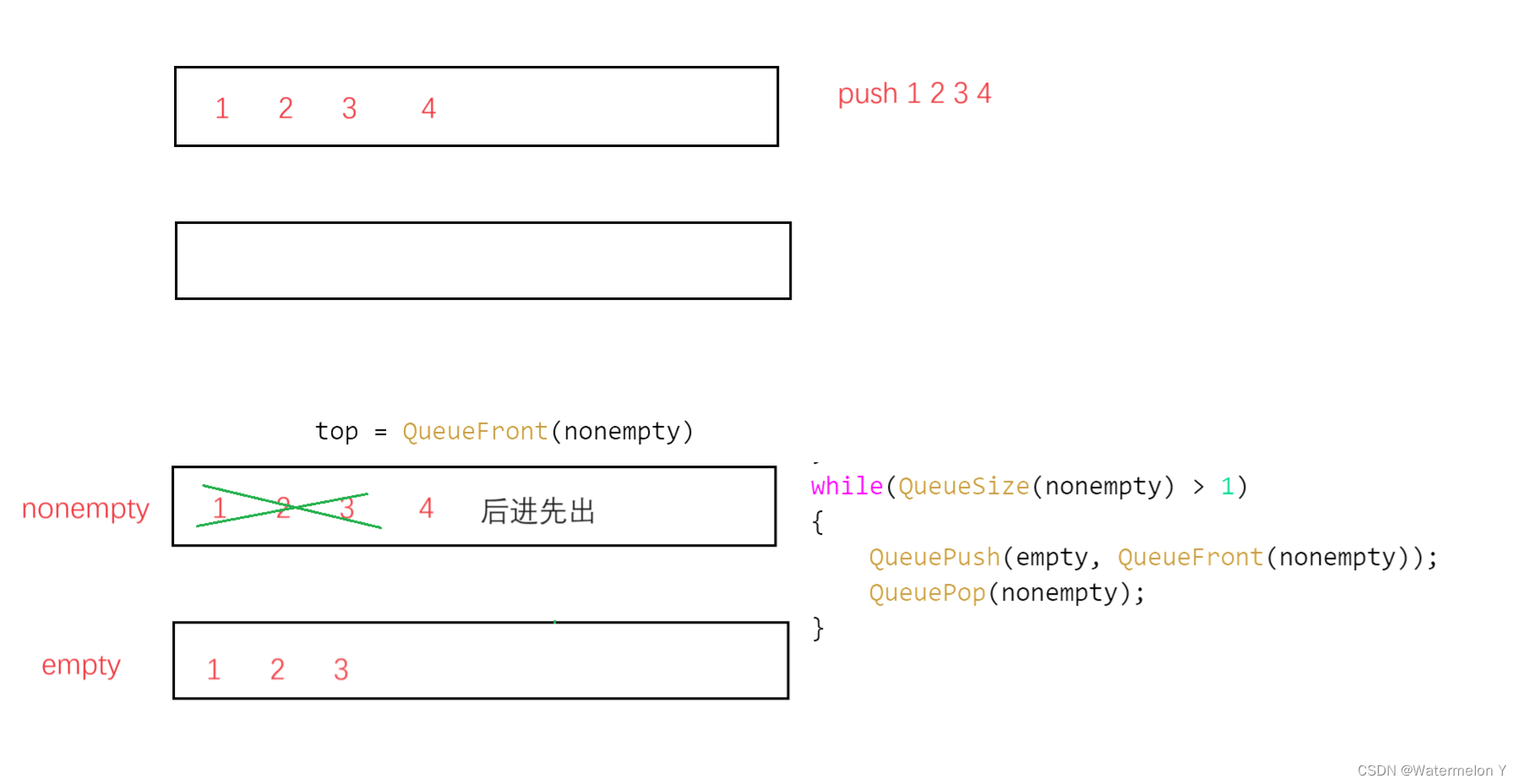
二 用栈实现队列
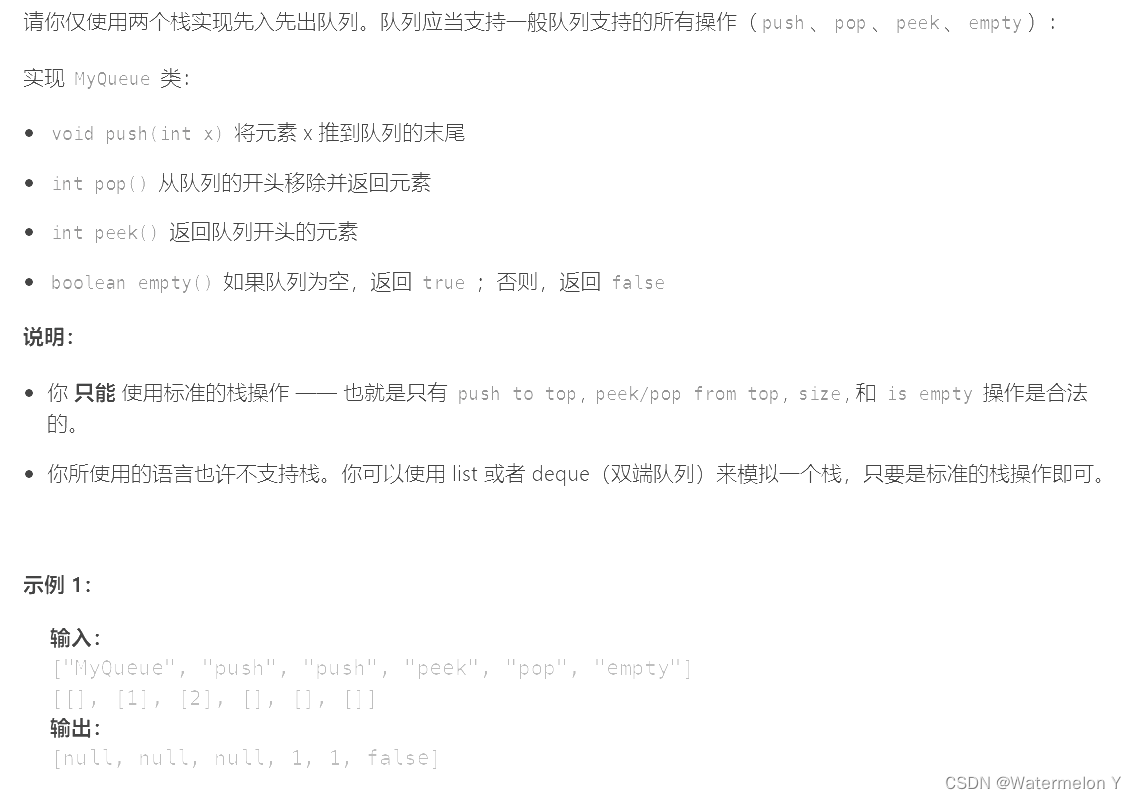

typedef int STDataType;
typedef struct Stack
{
STDataType* a;
int top;
int capacity;
}ST;
void STInit(ST* ps)
{
assert(ps);
ps->a = NULL;
ps->top = 0;
ps->capacity = 0;
}
void STDestroy(ST* ps)
{
assert(ps);
free(ps->a);
ps->a = 0;
ps->top = ps->capacity = 0;
}
void STPush(ST* ps, STDataType x)
{
assert(ps);
if (ps->top == ps->capacity)
{
int newcapacity = (ps->capacity == 0 ? 4 : ((ps->capacity) * 2));
STDataType* tmp = (STDataType*)realloc(ps->a, sizeof(STDataType) * newcapacity);
if (tmp == NULL)
{
perror("realloc fail");
exit(-1);
}
ps->a = tmp;
ps->capacity = newcapacity;
}
ps->a[ps->top] = x;
ps->top++;
}
void STPop(ST* ps)
{
assert(ps);
assert(ps->top > 0);
ps->top--;
}
STDataType STTop(ST* ps)
{
assert(ps);
assert(ps->top > 0);
return ps->a[ps->top - 1];
}
int STSize(ST* ps)
{
assert(ps);
return ps->top;
}
bool STEmpty(ST* ps)
{
assert(ps);
return ps->top == 0;
}
typedef struct {
ST StackPush;
ST StackPop;
} MyQueue;
MyQueue* myQueueCreate() {
MyQueue* pqueue = (MyQueue*)malloc(sizeof(MyQueue));
STInit(&pqueue->StackPush);
STInit(&pqueue->StackPop);
return pqueue;
}
void myQueuePush(MyQueue* obj, int x) {
STPush(&obj->StackPush, x);
}
int myQueuePeek(MyQueue* obj) {
if (STEmpty(&obj->StackPop))
{
while (!STEmpty(&obj->StackPush))
{
STPush(&obj->StackPop, STTop(&obj->StackPush));
STPop(&obj->StackPush);
}
}
return STTop(&obj->StackPop);
}
int myQueuePop(MyQueue* obj) {
int front = myQueuePeek(obj);
STPop(&obj->StackPop);
return front;
}
bool myQueueEmpty(MyQueue* obj) {
return STEmpty(&obj->StackPush) && STEmpty(&obj->StackPop);
}
void myQueueFree(MyQueue* obj) {
STDestroy(&obj->StackPush);
STDestroy(&obj->StackPop);
free(obj);
}
三 设计循环队列

typedef struct {
int* a;
int front;
int rear;
int k;
} MyCircularQueue;
MyCircularQueue* myCircularQueueCreate(int k) {
MyCircularQueue* obj = (MyCircularQueue*)malloc(sizeof(MyCircularQueue));
obj->a = (int*)malloc(sizeof(int) * (k + 1));//多开一个空间
obj->front = obj->rear = 0;
obj->k = k;
return obj;
}
bool myCircularQueueIsEmpty(MyCircularQueue* obj) {
return obj->front == obj->rear;
}
bool myCircularQueueIsFull(MyCircularQueue* obj) {
return (obj->rear + 1) % (obj->k + 1) == obj->front;
}
bool myCircularQueueEnQueue(MyCircularQueue* obj, int value) {
if (myCircularQueueIsFull(obj))
{
return false;
}
obj->a[obj->rear] = value;
obj->rear++;
obj->rear %= (obj->k + 1);
return true;
}
bool myCircularQueueDeQueue(MyCircularQueue* obj) {
if (myCircularQueueIsEmpty(obj))
{
return false;
}
obj->front++;
obj->front %= (obj->k + 1);
return true;
}
int myCircularQueueFront(MyCircularQueue* obj) {
if (myCircularQueueIsEmpty(obj))
{
return -1;
}
else
{
return obj->a[obj->front];
}
}
int myCircularQueueRear(MyCircularQueue* obj) {
if (myCircularQueueIsEmpty(obj))
{
return -1;
}
else {
return obj->a[(obj->rear + obj->k) % (obj->k + 1)];
}
}
void myCircularQueueFree(MyCircularQueue* obj) {
free(obj->a);
free(obj);
} 
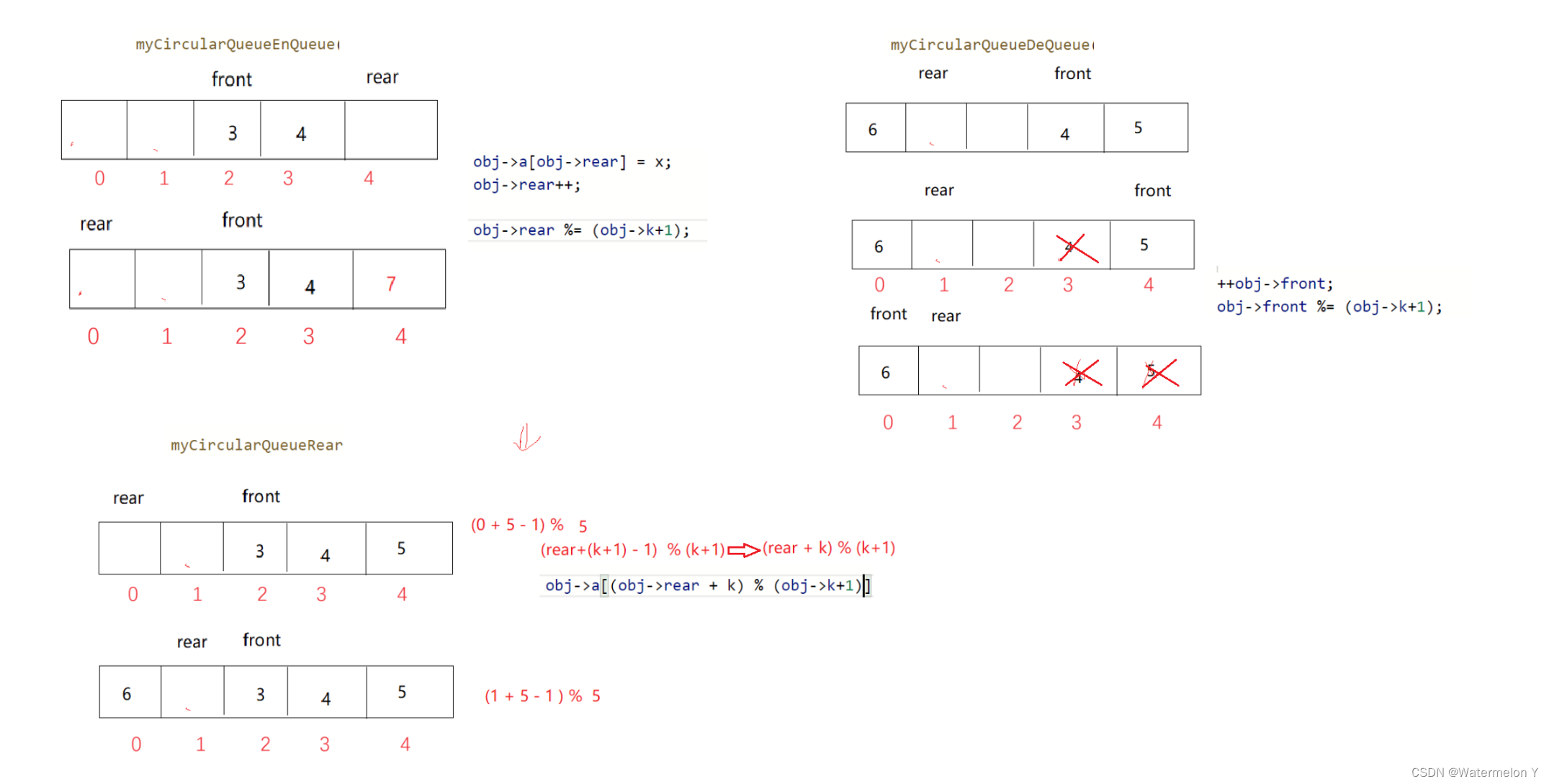
四 有效的括号
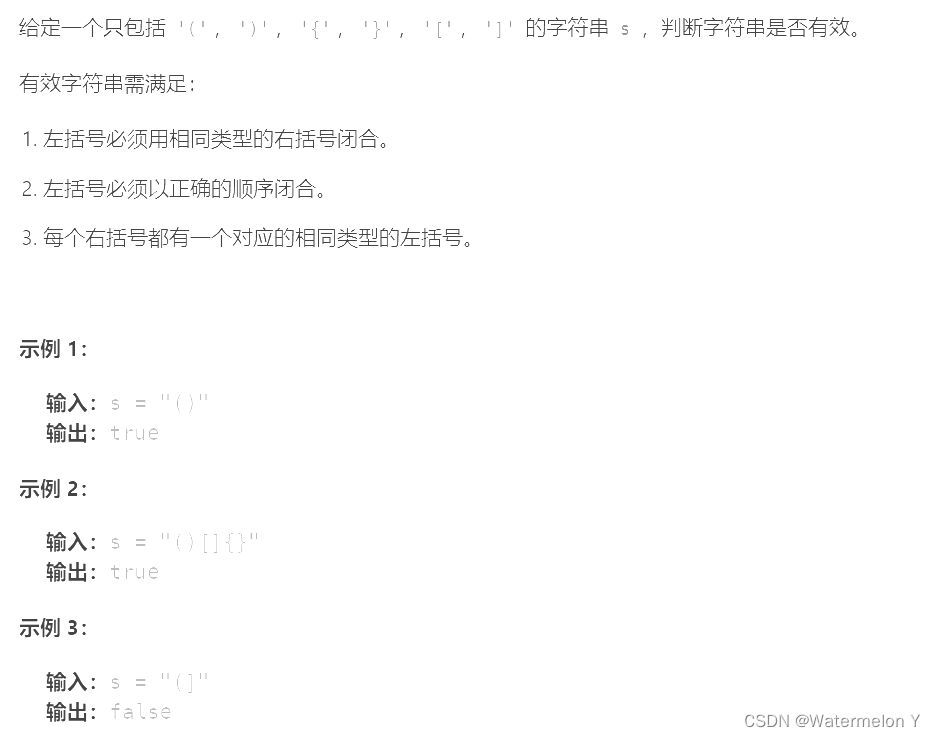
typedef char STDataType;
typedef struct Stack
{
STDataType* a;
int top;
int capacity;
}ST;
void STInit(ST* ps)
{
assert(ps);
ps->a = NULL;
ps->top = ps->capacity = 0;
}
void STDestroy(ST* ps)
{
assert(ps);
free(ps->a);
ps->a = NULL;
ps->top = ps->capacity = 0;
}
void STPush(ST* ps, STDataType x)
{
assert(ps);
if (ps->top == ps->capacity)
{
int newcapacity = (ps->capacity == 0 ? 4 : ps->capacity * 2);
STDataType* tmp = (STDataType*)realloc(ps->a, sizeof(STDataType) * newcapacity);
if (tmp == NULL)
{
perror("realloc fail");
exit(-1);
}
ps->a = tmp;
ps->capacity = newcapacity;
}
ps->a[ps->top] = x;
ps->top++;
}
void STPop(ST* ps)
{
assert(ps);
assert(ps->top > 0);
ps->top--;
}
STDataType STTop(ST* ps)
{
assert(ps);
assert(ps->top > 0);
return ps->a[ps->top - 1];
}
int STSize(ST* ps)
{
assert(ps);
return ps->top;
}
bool STEmpty(ST* ps)
{
assert(ps);
return ps->top == 0;
}
bool isValid(char* s) {
ST st;
STInit(&st);
while (*s)
{
if (*s == '(' || *s == '{' || *s == '[')
{
STPush(&st, *s);
}
else
{
if (STEmpty(&st))
{
STDestroy(&st);
return false;
}
char topval = STTop(&st);
STPop(&st);
if ((*s == ']' && topval != '[') || (*s == ')' && topval != '(') || (*s == '}' && topval != '{'))
{
STDestroy(&st);
return false;
}
}
s++;
}
bool ret = STEmpty(&st);
STDestroy(&st);
return ret;
} 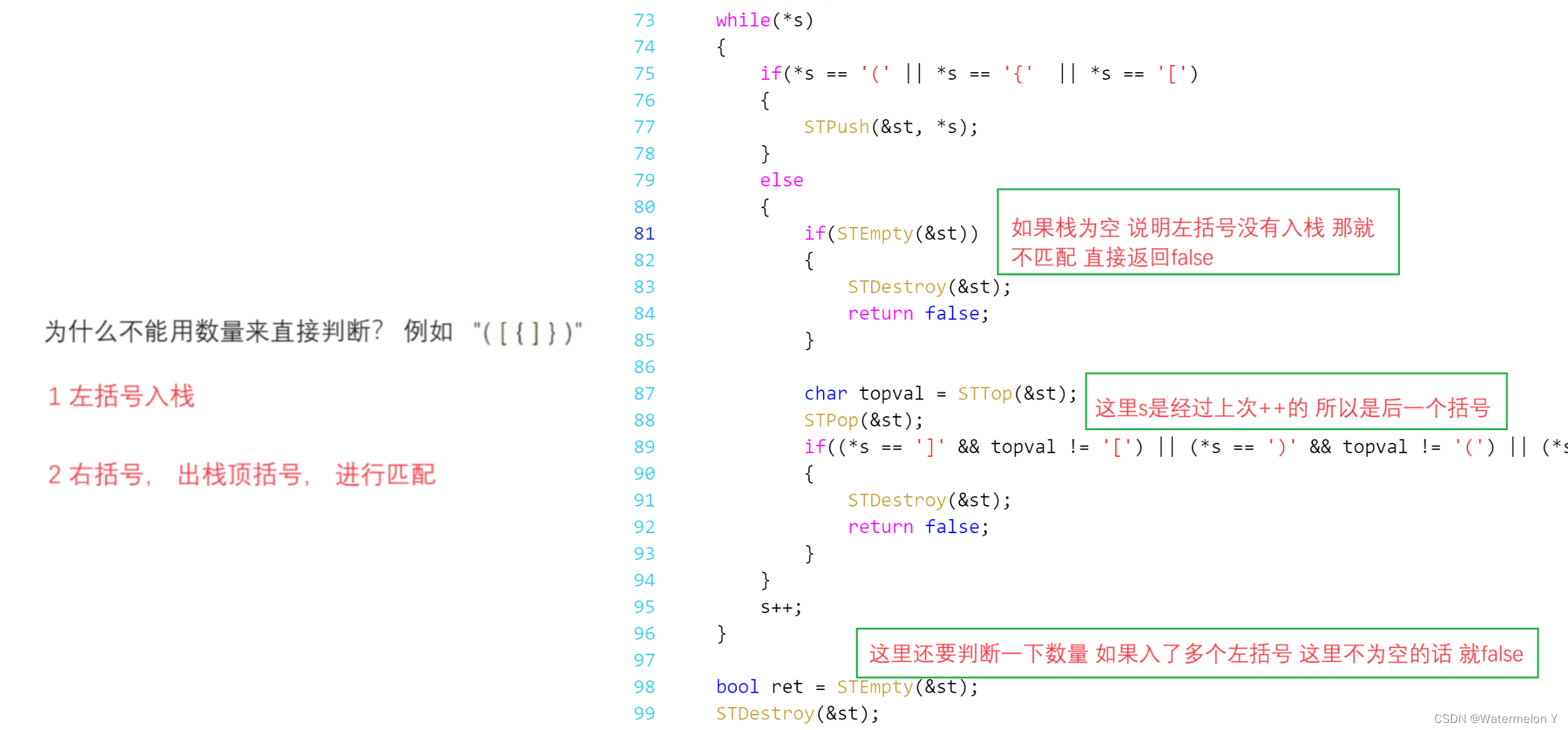





















 324
324











 被折叠的 条评论
为什么被折叠?
被折叠的 条评论
为什么被折叠?








